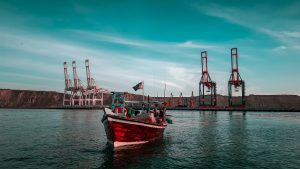Turkmenistan is poised to sign a memorandum of understanding (MoU) with Pakistan on accessing Gwadar Port in southwestern Balochistan province. The deal marks a significant step for Turkmenistan, making it the first Central Asian country to seek access to the strategically located Gwadar Port.
Economic motivations underlie the decisions of Pakistan and Turkmenistan to finalize the deal. It is expected to open up several layers of opportunities for both countries. However, it is beset with challenges.
A part of the China-Pakistan Economic Corridor (CPEC), Gwadar Port is under the operational control of the China Overseas Port Holding Company. Pakistan will be hoping that the Pakistan-Turkmenistan deal will boost business at Gwadar.
A landlocked nation, Turkmenistan has long sought access to warm-water ports to increase its alternatives to access global markets. Historically, it has relied on routes via Iran, Afghanistan, other Central Asian countries, Russia and the Caspian Sea, which is also landlocked. The initiative to link up with Gwadar Port presents Turkmenistan with a key outlet to the Arabian Sea and eventually to some of the most important international shipping routes.
As one of the world’s largest gas producers, Turkmenistan’s economy is primarily dependent on gas exports. It has long sought for diversified transit routes to expand its reach into markets in South Asia, Southeast Asia and even Africa.
In July this year, Turkmenistan signed a landmark agreement with Kazakhstan, Russia, and Iran to develop the North-South Transit Corridor. Similarly, Ashgabat signed another such partnership with Georgia, Azerbaijan, and Romania to establish the “Caspian Sea–Black Sea Corridor to expand its links with Europe,
Turkmenistan is not the first Central Asian nation to show interest in Pakistani ports. In 2021, Pakistan extended an offer to all Central Asian states to access Gwadar Port. At that time Pakistan and Uzbekistan signed bilateral agreements on preferential trade transit, customs procedures, and visa facilitation, while also proposing a major railway corridor through Afghanistan — an ambitious project yet to be realized.
Turkmenistan’s interest in Gwadar Port aligns with its broader push to reduce dependency on Russian and Iranian transit routes, especially in light of ongoing geopolitical instability and sanctions.
If the plan succeeds, Turkmenistan’s use of Gwadar Port for international shipments will streamline logistical operations from Central Asia through Pakistan to international markets. But the viability of this ambitious plan remains uncertain.
A crucial part of the initiative is the development of multimodal transport routes, which must pass through Afghanistan. However, relations between Pakistan and Afghanistan have soured since the Taliban came to power in Afghanistan in August 2021, primarily because of cross-border violence and Pakistan’s push to repatriate Afghan refugees. Tensions have further escalated over Pakistan’s construction of border fencing along the Durand Line.
Besides, the potential of Gwadar Port, which has long been envisioned as a global hub for maritime shipments as well as overland trade, is yet to be realized, even two decades after completion of the port’s construction. Political instability, logistical bottlenecks, and security challenges in Balochistan have hindered the port’s full operational capacity. The port currently requires significant upgrades to handle increased traffic. At present, the port has only three berth facilities, and lacks operational Liquified Natural Gas (LNG) terminals, although such terminals are part of the port’s future plans. The port also exclusively relies on road transport.
A core plan under CPEC was to build road and railway connections across Pakistan, linking Gwadar Port to major Pakistani cities and then into China’s western Xinjiang region. Currently, the pre-CPEC Makran coastal highway completed in 2004, connects Gwadar with Karachi. However, the $10 billion ML-1 railway stretching 2,600 kilometers from Karachi to Peshawar, which is an important component of the plan to upgrade Pakistan’s primary railway route, has seen limited progress, although it is around nine years since the project was first conceived.
For Pakistan, the ML-1 railway and realizing Gwadar’s potential could establish the port as an important transit hub for Central Asia, and bring economic benefits including increased flow of foreign exchange and job opportunities. Given Pakistan’s current economic crisis, rising debt, and ongoing negotiations with the IMF, with a recent $7 billion loan, the financial gains from increased transit trade and port activities through Gwadar have become more critical than ever.
However, concerns persist over connectivity infrastructure and the ongoing security situation in Balochistan, which has been plagued by insurgencies and violence. It could make Turkmenistan, known for its cautious foreign policy, think twice. Turkmenistan may be hesitant to fully invest in the project until it sees signs of improvement in Pakistan-Afghanistan relations, regional security, port capacity and transport infrastructure.
While Turkmenistan’s potential partnership with Pakistan to access Gwadar Port offers a win-win deal for both countries, the path to realizing these benefits is fraught with challenges. Without serious efforts to address the complex security situation, strained diplomatic relations in the region, and underdeveloped infrastructure the feasibility of this project will remain in question.

































